We left Bangalore at 4.00 am local time, and I reached The Curate's House at 2.30 pm UK time (which is 5.5 hours behind Bangalore...) and last night I was too excited to sleep...so I'm not on particularly scintillating form now! However, I've tons and tons more to share about India, if anyone can bear to hear it. It was the most amazing experience,- a month is just enough to make me aware that I've barely scratched the surface of understanding India,- but I'm so glad to have had the chance to begin at least. Will start saving for my return trip as soon asap, and will blog more very soon.
Thanks for reading and commenting while I've been away. I've not even tried to keep up with all your blogs, but it's been good to have contact with the blogging community via your appearances here. More once I've slept and cleared my desk!
Thursday, November 30, 2006
Saturday, November 25, 2006
The Prince and the Pauper
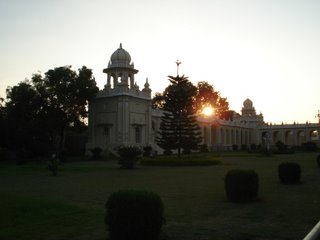 Once upon a time in Mysore there lived a Maharajah. He was immensely
Once upon a time in Mysore there lived a Maharajah. He was immenselywealthy and lived in a magnificent palace, with golden domes, floors
of inlaid marble, doors of carved silver and wonderful glass ceilings
engraved with peacocks. Once a year he allowed his people to marvel at
his splendour when he emerged for a "Darshan" festival, riding the
royal elephant in a golden howdah encrusted with jewels.
When his people saw him, the climax of a procession of guards and
bearers, of local dignitories and minor royals on lesser elephants, -
when they saw him they knew that truly their Maharajah was one of the
gods.
Once upon a time in Mysore there lived a Maharajah. Though he ruled
over thousands who struggled from day to day in abject poverty, he
would sometimes steal out of the palace at nightfall, disguised as an
ordinary man, to check that all was well in his city. Or perhaps he
didn't, but since people believed that he did, the effect was just as
good.
Once upon a time in Mysore, there lived a Maharajah, and at his gate
there was a beggarman, scavenging with the packs of stray dogs for
scraps from the royal table.
Years passed, and a new country was born, a country so vast that the
state the Maharajah ruled was only a fraction of the whole. As the new
country came to birth, many old things passed away. Soon there was no
Maharajah to ride on an elephant and receive the homage of the crowds.
The people were ruled by men from far away, who seldom visited to see
that all was well with them.
The palace that had glittered with the light of a thousand lamps stood
empty and quiet.
But at the gate, sixty years on, the beggarman, or his son's son,
remains.
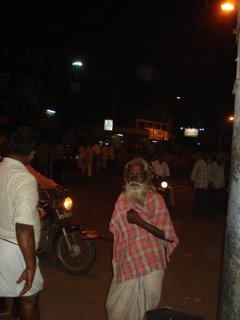 His daily routine is constant no matter who governs, for this
His daily routine is constant no matter who governs, for thisis India and turn where you will, the poor are always with you,
scavenging with the dogs for scraps from the rich man's table.
I'm assured by my hosts that today nobody needs to beg. There is land
set aside for "beggar colonies", where the poorest of the poor can
grow the staples of life, and receive a government stipend if they are
unfit for work.
Beggars remain, say my friends, because "It's easy money..." and, I
would guess, because for generations their caste has existed without
any self respect, believing that they have no value, no dignity to
lose.
Mahrajahs may come and go, and so may British tourists, but until the
caste system is excised from the mind of India, there will always be
a beggarman at the gate.
What the Papers Say
What the Papers say
To read The Times of India as a western visitor is a bizarre
experience. To start with there is the prose style, a blend of the
formal with the slang of yesteryear, punctuated with as many
exclamation marks as a letter from a teenage girl at boarding school! Headteacher's wife in the soup!Really!!!
Then there are the stories themselves. The frothily domestic reports
of school sports days and exam success, or the comings and goings of
Bollywood starlets sit side by side with accounts of sleaze and
corruption worthy of the most infamous banana republic, of gangsters
running protection rackets and of criminals elected to political
office direct from their prison cells.
In fact, to read the Times of India is to step into a world whose
boundaries are those of the fiction shelves in an airport bookstall,-
Mills and Boon meets macho thriller.
Glitterati or gangsters, who knows who will have the upper hand,- for
India is surely like nowhere else on earth.
To read The Times of India as a western visitor is a bizarre
experience. To start with there is the prose style, a blend of the
formal with the slang of yesteryear, punctuated with as many
exclamation marks as a letter from a teenage girl at boarding school! Headteacher's wife in the soup!Really!!!
Then there are the stories themselves. The frothily domestic reports
of school sports days and exam success, or the comings and goings of
Bollywood starlets sit side by side with accounts of sleaze and
corruption worthy of the most infamous banana republic, of gangsters
running protection rackets and of criminals elected to political
office direct from their prison cells.
In fact, to read the Times of India is to step into a world whose
boundaries are those of the fiction shelves in an airport bookstall,-
Mills and Boon meets macho thriller.
Glitterati or gangsters, who knows who will have the upper hand,- for
India is surely like nowhere else on earth.
Tuesday, November 21, 2006
A Question of Priorities
Out of town for the past 10 days, hence blog silence - and I'm now
writing to you from the southernmost tip of India, Kanyakumari where
the 3 seas meet. I'm here with the clergy from 2 CSI dioceses for
their annual conference...staying in a newly built centre where
electricity and water are so newly connected that they are erratic
even by Indian standards. Bishops here are autocratic in the extreme,
so the whole thing feels rather like Dotheboys hall....specially as we
sit and long tables and sing grace! We travelled here by coach...a 20
hour journey from hell on roads that gave up periodically and
degenerated into potholed dirt tracks...with a horn-happy driver and
50 overexcited Indian male clergy singing, I suspect, their local
equivalent of rugby songs! And on Friday we get to do it all again in
reverse....However, to be here overlooking the Indian Ocean is pretty
wonderful really....so it's churlish to grumble.
Rather than trying feverishly to fill you in on all that has happened
since I last posted, I'll try and get down to the internet cafe to
post a series of reflections on some aspects of the continuing mad
extremes that are my experience of India.
After the agony of our visit to the AIDS project came play time, as we
visited the Bhannergatta nature reserve for close encounters with
bears and deer, lions and tigers, all in their natural habitat.
Best of all, we mingled freely with a family of elephants, scratching
behind their ears, feeding them hay and leaping out of the way just in
time when they offered us an unsolicited shower.
They were so delightful with their air of benevolent wisdom, it's quite
understandable that so many conservationists devote their careers to
them. Among them are the staff of A Rocha India,- a branch of the
international Christian Conservation group,- and they had much to tell
us of their struggles. In a country with such huge social problems, where tens of thousands lack the basic necessities of life, taking time and money to conserve wildlife might seem a reckless luxury. What's worse, in many cases humans and animals are in direct conflict...Villagers scratching a living on the fringes of India's great forests face ruin if a herd of elephants emerges to raid their crops...Recently a government compensation scheme has been introduced, but it covers only part of the damage...and the excellent laws in place to protect wildlife are almost impossible to enforce. According to a popular saying here "It's a long way to Delhi" and whatever the law may say on this, or any other topic, grassroots reality is very different.
Outraged villagers take matters into their own hands or try to make a few hundred rupees by poaching...after all, the international ban on ivory sales doesn't matter if you are already operating outside the law. As is the way of things, when prosecutions are brought, it's only the small fry that are caught...the fat cats remain safe, hundreds of miles away.
So, elephant numbers have declined despite their protected status, their habitat threatened by Bangalore's urban sprawl and by the quarrying work (illegal again) that carries on even in the heart of the national park. We travelled on metalled roads that you'll not find on any map, to settlements that don't officially exist, following the stream of trucks that flows each day from quarries to city.
All in all, an Indian conservationist's lot is not a happy one,- but
the world would be so much poorer if in a decade the wildlife we were
privileged to meet could only be found within the safe but artificial
confines of nature reserves. A Rocha is working with both villagers
and city dwellers to educate them in the essential balance and mutual
dependence of nature and humanity. Elephants are sacred to the Hindu
god Ganesh, while Buddhism teaches reverence for all life...so
ironically their task is hardest with the Christian community. Our
tendency to confuse stewardship with ownership, or, more laudably, a
concern that starving children should be fed before we turn to
endangered animals, can make our education a slow process.
But even amid the poverty of India, I cant help but remember that when
the 5000 were fed, there were baskets left over...enough to share with
birds and beasts as well.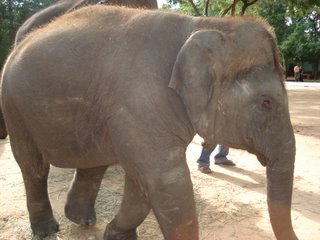
And I did so love those elephants!
writing to you from the southernmost tip of India, Kanyakumari where
the 3 seas meet. I'm here with the clergy from 2 CSI dioceses for
their annual conference...staying in a newly built centre where
electricity and water are so newly connected that they are erratic
even by Indian standards. Bishops here are autocratic in the extreme,
so the whole thing feels rather like Dotheboys hall....specially as we
sit and long tables and sing grace! We travelled here by coach...a 20
hour journey from hell on roads that gave up periodically and
degenerated into potholed dirt tracks...with a horn-happy driver and
50 overexcited Indian male clergy singing, I suspect, their local
equivalent of rugby songs! And on Friday we get to do it all again in
reverse....However, to be here overlooking the Indian Ocean is pretty
wonderful really....so it's churlish to grumble.
Rather than trying feverishly to fill you in on all that has happened
since I last posted, I'll try and get down to the internet cafe to
post a series of reflections on some aspects of the continuing mad
extremes that are my experience of India.
After the agony of our visit to the AIDS project came play time, as we
visited the Bhannergatta nature reserve for close encounters with
bears and deer, lions and tigers, all in their natural habitat.

Best of all, we mingled freely with a family of elephants, scratching
behind their ears, feeding them hay and leaping out of the way just in
time when they offered us an unsolicited shower.
They were so delightful with their air of benevolent wisdom, it's quite
understandable that so many conservationists devote their careers to
them. Among them are the staff of A Rocha India,- a branch of the
international Christian Conservation group,- and they had much to tell
us of their struggles. In a country with such huge social problems, where tens of thousands lack the basic necessities of life, taking time and money to conserve wildlife might seem a reckless luxury. What's worse, in many cases humans and animals are in direct conflict...Villagers scratching a living on the fringes of India's great forests face ruin if a herd of elephants emerges to raid their crops...Recently a government compensation scheme has been introduced, but it covers only part of the damage...and the excellent laws in place to protect wildlife are almost impossible to enforce. According to a popular saying here "It's a long way to Delhi" and whatever the law may say on this, or any other topic, grassroots reality is very different.
Outraged villagers take matters into their own hands or try to make a few hundred rupees by poaching...after all, the international ban on ivory sales doesn't matter if you are already operating outside the law. As is the way of things, when prosecutions are brought, it's only the small fry that are caught...the fat cats remain safe, hundreds of miles away.
So, elephant numbers have declined despite their protected status, their habitat threatened by Bangalore's urban sprawl and by the quarrying work (illegal again) that carries on even in the heart of the national park. We travelled on metalled roads that you'll not find on any map, to settlements that don't officially exist, following the stream of trucks that flows each day from quarries to city.
All in all, an Indian conservationist's lot is not a happy one,- but
the world would be so much poorer if in a decade the wildlife we were
privileged to meet could only be found within the safe but artificial
confines of nature reserves. A Rocha is working with both villagers
and city dwellers to educate them in the essential balance and mutual
dependence of nature and humanity. Elephants are sacred to the Hindu
god Ganesh, while Buddhism teaches reverence for all life...so
ironically their task is hardest with the Christian community. Our
tendency to confuse stewardship with ownership, or, more laudably, a
concern that starving children should be fed before we turn to
endangered animals, can make our education a slow process.
But even amid the poverty of India, I cant help but remember that when
the 5000 were fed, there were baskets left over...enough to share with
birds and beasts as well.

And I did so love those elephants!
Monday, November 20, 2006
Good in Parts
Hatti Ghandi is not very inteligent.
Hatti Ghandi has been posting "mother is hell and wappy" posts to ordinary time.
Hatti Ghandi is half expecting to be lynched
But, she was well & happy earlier and sent her love a...very long time ago.
So sorry
xxxxx
C/HG/L
Hatti Ghandi has been posting "mother is hell and wappy" posts to ordinary time.
Hatti Ghandi is half expecting to be lynched
But, she was well & happy earlier and sent her love a...very long time ago.
So sorry
xxxxx
C/HG/L
Friday, November 10, 2006
Thoughts on the British in india
You don't have to spend long here to be aware of the legacy of the Raj. It's there in the road names, "Hudson Circle", "Brigade Road", or the rather idiosyncratic signs
"Do not commit nuisance here" "Wanted, receptionist. Fresh or experienced."
It's there in the public school apsirations of the csi schools, with their culture of rousing school songs, "mens sana.." and all the trappings of a vanished Empire, tiffin and punkah wallahs.
Everywhere you go, there's no escape. For a socialist type like me, it's been deeply uncomfortable.
Worship last Sunday was a bizarre recreation of the church of my childhood. I presided at a Eucharist that was broadly series 2 (modified Book of Common Prayer, for non Anglicans!)....a robed choir sang Merbecke, and we processed in to "All things B & B". Only the packed church, with congregation spilling outside, the sea of colour when i looked down at the congregation, and the hands outstretched at the altar rail reminded me that i was in India.
Disturbingly, to be white still seems a passport to instant respect. A blessing from English hands is valued more than an Indian one, and to the young indian to be westernised to be to sophisticated and successful.
No matter that the IT industry which is making some in Bangalore rich is bringing huge social problems in its wake, as young people find themselves wealthy beyond their wildest dreams in a country where the cost of living is breathtakingly low.
Having brought a car, and thus contributed to the dual problems of congestion and pollution, drink and drugs are the only remaining ways to spend their easy wealth.
With both men and women employed (often doing antisocial hours to match the time zones of the countries they are calling) the traditional Indian extended family is breaking down creating new problems of geriatric and child care....But despite this, to be westernised is perceived as a Good Thing.
After a few days, i was ready to hang my head in shame and slink away...but then, in trust indian fashion, just as i was sure i knew something, a fresh circumstance challenged my views.
You see, I met Andrew, a Sunday school worker with CSI. Like 70% of indian Christians, Andrew's family is dalit...less than human, the lowest of the low...valued so much less than beasts that are revered as gods. But his grandfather converted to Christianity, following what amounted to a miracle...
He was employed by a British tea planter, a Christian who held daily prayers for his staff...but grandfather, a devout hindu, was not convinced. Then one day he had an accident, breaking his hip...hospital treatment was some days journey away, and by the time he arrived gangrene had set in and amputation seemed inevitable. Surgery was planned for the following day, and he lay in the ward, in great pain and utter desolation...He noticed a picture of Jesus, which he recognised from his employer's home...and in some desperation prayed "I am in too much pain. If you are indeed a god, act."
That night his pain did not keep him awake, and instead he slept deeply and dreamed vividly of two men in white who came to him and assured him that Jesus had indeed healed his leg.
In the morning, the gangrene had gone, the broken bone was whole and, not surprisingly, grandfather converted to Christianity on the spot, though facing huge opposition and persecution from his own community. Even now, when Andrew returns home to his village, he is out cast.
But, he says, it is worth it.
For Andrew, Christianity represents an open door, an escape route from the confines of the eternal cycle of karma in to freedom and dignity as a child of God.
Small wonder, then, that the Christian missionaries of yesteryear are treated like beloved relatives, spoken of as if they've only just left the room, remembered as people and not just in the names of hospitals, churches and schools that they founded to make a difference.
If everything is determined by karma there is no impetus for social change, no sense of mutual responsibility...but again and again we see the church acting, working with those who had believed themselves beneath notice, and doomed to eternal misery.
As i've said before, nothing is straightforward here!
"Do not commit nuisance here" "Wanted, receptionist. Fresh or experienced."
It's there in the public school apsirations of the csi schools, with their culture of rousing school songs, "mens sana.." and all the trappings of a vanished Empire, tiffin and punkah wallahs.
Everywhere you go, there's no escape. For a socialist type like me, it's been deeply uncomfortable.
Worship last Sunday was a bizarre recreation of the church of my childhood. I presided at a Eucharist that was broadly series 2 (modified Book of Common Prayer, for non Anglicans!)....a robed choir sang Merbecke, and we processed in to "All things B & B". Only the packed church, with congregation spilling outside, the sea of colour when i looked down at the congregation, and the hands outstretched at the altar rail reminded me that i was in India.
Disturbingly, to be white still seems a passport to instant respect. A blessing from English hands is valued more than an Indian one, and to the young indian to be westernised to be to sophisticated and successful.
No matter that the IT industry which is making some in Bangalore rich is bringing huge social problems in its wake, as young people find themselves wealthy beyond their wildest dreams in a country where the cost of living is breathtakingly low.
Having brought a car, and thus contributed to the dual problems of congestion and pollution, drink and drugs are the only remaining ways to spend their easy wealth.
With both men and women employed (often doing antisocial hours to match the time zones of the countries they are calling) the traditional Indian extended family is breaking down creating new problems of geriatric and child care....But despite this, to be westernised is perceived as a Good Thing.
After a few days, i was ready to hang my head in shame and slink away...but then, in trust indian fashion, just as i was sure i knew something, a fresh circumstance challenged my views.
You see, I met Andrew, a Sunday school worker with CSI. Like 70% of indian Christians, Andrew's family is dalit...less than human, the lowest of the low...valued so much less than beasts that are revered as gods. But his grandfather converted to Christianity, following what amounted to a miracle...
He was employed by a British tea planter, a Christian who held daily prayers for his staff...but grandfather, a devout hindu, was not convinced. Then one day he had an accident, breaking his hip...hospital treatment was some days journey away, and by the time he arrived gangrene had set in and amputation seemed inevitable. Surgery was planned for the following day, and he lay in the ward, in great pain and utter desolation...He noticed a picture of Jesus, which he recognised from his employer's home...and in some desperation prayed "I am in too much pain. If you are indeed a god, act."
That night his pain did not keep him awake, and instead he slept deeply and dreamed vividly of two men in white who came to him and assured him that Jesus had indeed healed his leg.
In the morning, the gangrene had gone, the broken bone was whole and, not surprisingly, grandfather converted to Christianity on the spot, though facing huge opposition and persecution from his own community. Even now, when Andrew returns home to his village, he is out cast.
But, he says, it is worth it.
For Andrew, Christianity represents an open door, an escape route from the confines of the eternal cycle of karma in to freedom and dignity as a child of God.
Small wonder, then, that the Christian missionaries of yesteryear are treated like beloved relatives, spoken of as if they've only just left the room, remembered as people and not just in the names of hospitals, churches and schools that they founded to make a difference.
If everything is determined by karma there is no impetus for social change, no sense of mutual responsibility...but again and again we see the church acting, working with those who had believed themselves beneath notice, and doomed to eternal misery.
As i've said before, nothing is straightforward here!
Bitter reality
 Yesterday I made a new friend...Her name is Anjali, and she's on the right in this picture. She is 24. She cooked my lunch, and placed a garland of jasmine round my neck, the heady fragrance almost drowing the stench of decaying rubbish. She is happy because she is part of a pilot project which offers her a change of career. She will learn to use an ancient treadle Singer sewing machine, to make industrial gloves. She will earn a living wage, but she won't do much living.
Yesterday I made a new friend...Her name is Anjali, and she's on the right in this picture. She is 24. She cooked my lunch, and placed a garland of jasmine round my neck, the heady fragrance almost drowing the stench of decaying rubbish. She is happy because she is part of a pilot project which offers her a change of career. She will learn to use an ancient treadle Singer sewing machine, to make industrial gloves. She will earn a living wage, but she won't do much living.Her former job was as a "Commercial Sex Worker", for Anjali comes from a dalit family, and this was the only source of income available.
Now she is doubly untouchable, for my friend with the dancing eyes and the smile which communicates across any language barrier has AIDS.
And because she is the lowest of the low, in a developing country there will be no retroviral drugs, no hospice care.
Girls like Anjali die by the roadside, for dalit life is cheap.
But we held hands, admired each others children and laughed together as friends do.
Anjali is my friend, but in 5 years or so she will be dead.
Kyrie eleison.
Wednesday, November 08, 2006
And so the adventure continues
A disjointed catch-up blog..
Yesterday we visited two schools, side by side...again this bizarre juxtaposition of privilege and poverty...one was the sort of nice little girls school that I attended in St Leonards on Sea in the 1960s,with children in blue gingham and matching hair ribbons, the other run for slum children who get free meals from the church as they would otherwise be too hungry to learn.
Both wonderful...at the first, I was mobbed, literally, by hundreds of little girls demanding "Autograph, aunty"....could barely write, as books, pens, paper pressed up to my face! Digital photography is a great ice breaker...all children are so thrilled and excited to see themselves, and know their pictures will be coming home with me!
Today was the inauguration of the project for girls from the streets which we've been supporting as a diocese...delightful children,fanstastic staff and more or less non existent facilities....and these are the fortunate ones. Beside the CSI hospital (another place with few resources beyond loving care) there is the most appalling slum/shanty town, teeming with life and mess and misery...but it seems to be a fact of life accepted by all...and amid all the squalour is a mission school that has been there for 130 plus years. I'm being challenged in my attitudes to the impact of the British on India, which is far more positive than I had imagined...I'll write more about this when things are less frantic, but only have a few minutes of blogging time now.
Tomorrow we visit an AIDS project and on Friday some sort of ecology programme, which includes visiting a nature reserve. Cross your fingers that I get to see an elephant! It seems a teeny ambition in the face of everything else, but I would love to be able to tell the children at the Infants School about it!
And next week, all being well, I will leave the CSI Guest House to stay with a woman who has a parish in Channapatna, a rural area which is, I think, quite deprived...I feel I'm only scratching the surface, learning so much each day that I'll need months to process it. On Sunday the CSI Lectionary included that bit from Romans about the renewing of our minds...that is surely what is happening for me.
I wish I had longer to share thoughts and feelings, or better yet that some of you were here with me. I cant believe that this amazing experience is supposed to be "work"...but I would like everyone I know to be able to share it. Nothing will be the same again, I hope!
Yesterday we visited two schools, side by side...again this bizarre juxtaposition of privilege and poverty...one was the sort of nice little girls school that I attended in St Leonards on Sea in the 1960s,with children in blue gingham and matching hair ribbons, the other run for slum children who get free meals from the church as they would otherwise be too hungry to learn.
Both wonderful...at the first, I was mobbed, literally, by hundreds of little girls demanding "Autograph, aunty"....could barely write, as books, pens, paper pressed up to my face! Digital photography is a great ice breaker...all children are so thrilled and excited to see themselves, and know their pictures will be coming home with me!
Today was the inauguration of the project for girls from the streets which we've been supporting as a diocese...delightful children,fanstastic staff and more or less non existent facilities....and these are the fortunate ones. Beside the CSI hospital (another place with few resources beyond loving care) there is the most appalling slum/shanty town, teeming with life and mess and misery...but it seems to be a fact of life accepted by all...and amid all the squalour is a mission school that has been there for 130 plus years. I'm being challenged in my attitudes to the impact of the British on India, which is far more positive than I had imagined...I'll write more about this when things are less frantic, but only have a few minutes of blogging time now.
Tomorrow we visit an AIDS project and on Friday some sort of ecology programme, which includes visiting a nature reserve. Cross your fingers that I get to see an elephant! It seems a teeny ambition in the face of everything else, but I would love to be able to tell the children at the Infants School about it!
And next week, all being well, I will leave the CSI Guest House to stay with a woman who has a parish in Channapatna, a rural area which is, I think, quite deprived...I feel I'm only scratching the surface, learning so much each day that I'll need months to process it. On Sunday the CSI Lectionary included that bit from Romans about the renewing of our minds...that is surely what is happening for me.
I wish I had longer to share thoughts and feelings, or better yet that some of you were here with me. I cant believe that this amazing experience is supposed to be "work"...but I would like everyone I know to be able to share it. Nothing will be the same again, I hope!
Monday, November 06, 2006
The rich man in his castle
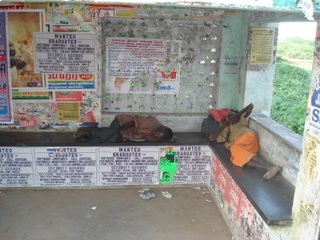 Charity is part of life here. The the caste system has been outlawed, its legacy remains. Sweepers are shunned by the majority, as if they remained untouchable. Nobody seems perturbed at the bodies sprawled on benches or by the roadside, even in the heart of the city.
Charity is part of life here. The the caste system has been outlawed, its legacy remains. Sweepers are shunned by the majority, as if they remained untouchable. Nobody seems perturbed at the bodies sprawled on benches or by the roadside, even in the heart of the city.We spend a morning at a sports day for one of the elite senior schools where we are treated like royalty, led along a red carpet to a splendid pavilion, where we are showered with gifts and bouquets, and constantly plied with food and drink (this is a recurring feature of Indian hospitality....not the country for a crash diet!)
Our 'minder' for the morning is a senior teacher, and we are made very conscious of the strict hierarchy at work...at the bottom of the heap the maintenance staff in their uniform saris. They are, she assures us, fortunate to work here, where they are given a good uniform, including a sari for special occasions...and the same bonus as the teachers at Christmas...Then she betrays herself
'Truly, if you saw them going home in their saris you would think they were somebody. They dress too well."
Knowing who fits where in the system still matters....LCM's profession has caused huge confusion..is he a labourer? if so, how can he have married a pastor?? You can hear the incredulity in our hosts' voices....
There is, though, no embarassment, no discomfort at the disparity in facilities between children at the school and those at a hostel for the destitute in the same compound. The hostel Warden says
"The school provides shoes for every boy here. Are we not fortunate?"
There is not a trace of irony in his voice.
And everywhere we go there are the beggars. We have been told, firmly and repeatedly, not to give directly, no matter how desperate their plight appears.
So we avert our gaze and shake our heads. Sometimes a child runs beside me, liquid brown eyes beseeching me "Amma, amma..."
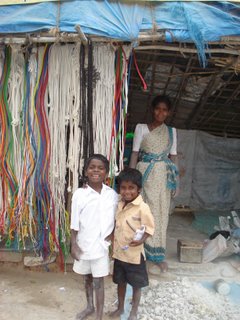
What will happen to him?
Only a handful are rescued. What if nobody responds, ever? No Welfare State to scoop him up and save him. He is no more than 6. Will he even reach double figures?
Oh to make a difference, but all I could do in a lifetime would change so very little, the tiniest drop in the vast ocean of human need.
Better after all to channel my help.
Already I've seen splendid projects, schemes that really can change lives.
But still, there are the beggars....
It's me! Kathryn!! In India!!!
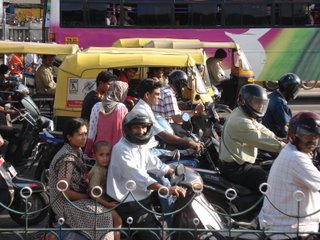 I've been here 4 days and my senses are reeling. India seems to inspire huge generalisations and then immediately force me to revise them...It's a terrible place to be a child- those tiny boys at the street kids project had been sleeping rough at the station...its a wonderful place to be a child - they are welcomed and indulged everywhere they go. It's so modern...so ancient...
I've been here 4 days and my senses are reeling. India seems to inspire huge generalisations and then immediately force me to revise them...It's a terrible place to be a child- those tiny boys at the street kids project had been sleeping rough at the station...its a wonderful place to be a child - they are welcomed and indulged everywhere they go. It's so modern...so ancient...Basically, it defies description, except in terms of sensory overload. As I write, I can hear the frantic barking of a pack of stray dogs the putter of the ubiquitous scooters, the whistle of traffic police and motor horns, always motor horns. The only rule of the road seems to be Honk and Hope as traffic weaves in and out of impossibly tight spaces with no apparent system at work. Little yellow rickshaw trikes are everwhere crammed with a family of 4 here, a solitary veiled begum there. A bus queue across the road heaves and twitters like a flock of tropical birds which takes off when the bus arrives, to cram impossibly into the vehicle already filled to overflowing.
A couple speed past on a 2 wheeler he the epitome of western modernity talking on his mobile, or plugged into his ipod, she representing the past in the elegant jewel-bright beauty of her sari. They belong together, for it seems to me that India is one vast contradiction.
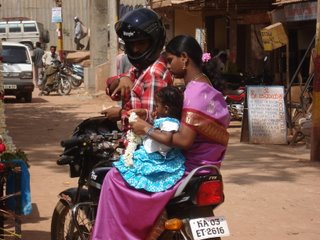
Repeatedly we're brought up against this. We visited a school for special needs children from the slums, and witnessed miracles wrought with almost no resources but love and patience...We left that building and walked a few yards across the compound of the same church to enter a school, the glossiest of glossy establishments whose marble hallways and state of the art facilities would not disgrace Eton! The children privileged to come here are on another planet from their neighbours across the compound. The Principle, urbane and charming in his beautiful boardroom suit, is frank about the issues facing his country.
"Yes education is compulsory for all,- but where are the schools?
Children work from an early age, specially in rural areas. The church does what it can but little can be achieved without bribery. So many people, so many languages...Who can manage India?"
Friday, November 03, 2006
from India via Cardiff
Good in Parts
comes the news - the mother has ARRIVED! Well, my mother at least (hello, Hatti Ghandi here, and yes I am wearing a hat. A wooly one. My heater refuses to work.) And, although she has not forgotten you, the internet seems to be being rather unoblidging when it comes to blogspot (shades of me in Thailand, for a small number of you)
But she is there and it is a blur of colurs and experiences and all kinds of wonders and she seems to be having, and to be about to have, an utterly fantastic time.
....actually, the computer issue may turn out a little complex, but we shall see.
Love to all from her, and to those I know from me
xxxx
comes the news - the mother has ARRIVED! Well, my mother at least (hello, Hatti Ghandi here, and yes I am wearing a hat. A wooly one. My heater refuses to work.) And, although she has not forgotten you, the internet seems to be being rather unoblidging when it comes to blogspot (shades of me in Thailand, for a small number of you)
But she is there and it is a blur of colurs and experiences and all kinds of wonders and she seems to be having, and to be about to have, an utterly fantastic time.
....actually, the computer issue may turn out a little complex, but we shall see.
Love to all from her, and to those I know from me
xxxx
Subscribe to:
Posts (Atom)